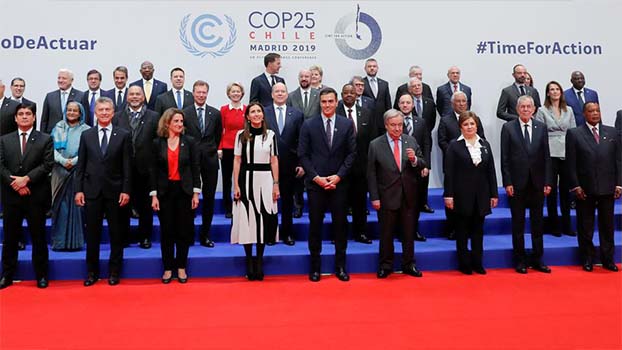Pursuing climate justice in COP25 talks


The two-week long international conference on harmful climate change that started on Sunday, December 2 in Madrid should provide a fresh impetus to international efforts to push the world toward a carbon-free future. Ministers and officials from more than 190 countries gathered in Madrid for the two weeks of talks aimed at ironing out technical details of the 2015 Paris agreement, which needs to be completed for nations to focus on the progress on cutting carbon emissions.
The conference, which will incorporate the 25th Conference of the Parties to the United Nations Framework Convention on Climate Change (UNFCCC), is an opportunity for all countries of the world to come together to seek solutions and resolutions regarding arguably the most pressing global issue of our times. We hope COP25 will serve the world as a springboard for progress ahead of key 2020 deadlines established by the 2015 Paris Agreement.
The final UN climate conference before the defining year of 2020, when many countries must submit new climate action plans, should address all key concerns to ensure that the rules set by the landmark climate pact will be implemented smoothly and effectively.
Of late, a report from the Intergovernmental Panel on Climate Change, compiled by hundreds of scientists from around the world, has warned that the damage that was previously thought to be caused by a rise in average temperatures by 2 degrees will come much sooner at the 1.5-degree mark.
It is needless to mention that this dire warning has provoked calls for efforts to limit warming to 1.5 degrees. This would require all the countries to step up their efforts to reduce planet-warming emissions to net zero around 2050. Not to mention that whether the international community can commit itself to the tougher target of avoiding 1.5 degrees of warming depends on the actions taken by leading emitters.
Hence, further investments are needed from rich countries to reduce greenhouse gas emissions and cope with the impacts of global heating. Amid rising temperatures, wildfires, heatwaves, droughts and floods, the danger signals are clear and the world must unite together to tackle the catastrophes in the coming days.
China and India are the largest polluter and the third-largest emitter, are showing little willingness to embrace higher emissions targets. The United States, second on the list, has even invoked the accord’s formal withdrawal mechanism, a process leading to an official exit in November 2020. These major powers need to take a fresh, hard look at the fact that they and other members of the Group of 20 account for some 80 percent of global emissions of heat-trapping gases.
Though governments around the world governments committed to implement effective climate crisis solutions by the end of 2020, but that has not happened. In fact, some countries like the United States have pulled out of the Paris Agreement altogether, and other countries have not been ambitious enough. Norway, a leader in cutting emissions, continues to produce oil and gas. China too has taken action to reduce emissions, but failed to meet its targets, and might now even be increasing emissions. Despite moves towards renewable energy, India is investing in new coal-fired electricity plants. In the midst of a climate emergency, retreat and inaction are tantamount to sanctioning ecocide. They reflect profound failure to honour collective global commitment to protect the most vulnerable.
It needs no emphasizing that fighting climate change requires worldwide concerted effort, with all countries acknowledging their responsibilities. For Bangladesh and other LDC countries, indeed Cop 25 is a ground to once again bring to attention the disparities that continue to exist.
The world is now going through a situation where the most vulnerable countries, which deserve the highest level of priority, are failing to access whatever support that is being realised. Major emitters show extreme reluctance on mitigation, which may wreck the international climate regime and put the climate vulnerable countries like Bangladesh at peril.
However, while addressing a general roundtable discussion at the 25th session of the Conference of the Parties (COP25) at Madrid, Prime Minister Sheikh Hasina on Monday asked the global community to take the responsibility for climate migrants as they would be displaced for no fault of their own. Sheikh Hasina also addressed climate change as an existential threat for Bangladesh as it is envisaged that up to 2050 from now, Bangladesh’s annual GDP loss will be 2 percent and at this rate by 2100, the loss will be a staggering 9 percent. Human settlements have been affected in Bangladesh due to extreme climate events such as Cyclones Sidr and Aila over past years. One of the most adverse and prolonged impact of climate change in Bangladesh has been observed in the form of climate-migration. Immediate steps should be taken to protect people from environmental risks and reduce unwanted migration due to climate change.
Like most of the climate vulnerable countries, Bangladesh has done almost nothing to cause global warming unlike China, India and America as they bear a great deal of responsibility for the emissions already in the atmosphere. As developed countries are accountable for the severe consequences of climate change, developed countries should provide necessary financial, technological and intellectual support to the developing countries to tackle climate change.
Considering the situation, international community should realize the need for formulating coherent and research-backed policy, legal and institutional framework at global scale to address climate migration. Current climate and energy policies are too weak to reverse trends in global emissions. Policies have been successful to varying degrees in deploying low-carbon technologies, such as solar and wind power and electric vehicles. But these often add to existing demand for energy rather than displacing technologies that emit CO2, particularly in countries where energy demand is growing.
Sayeed Hossain Shuvro is Editorial Assistant, Bangladesh Post


